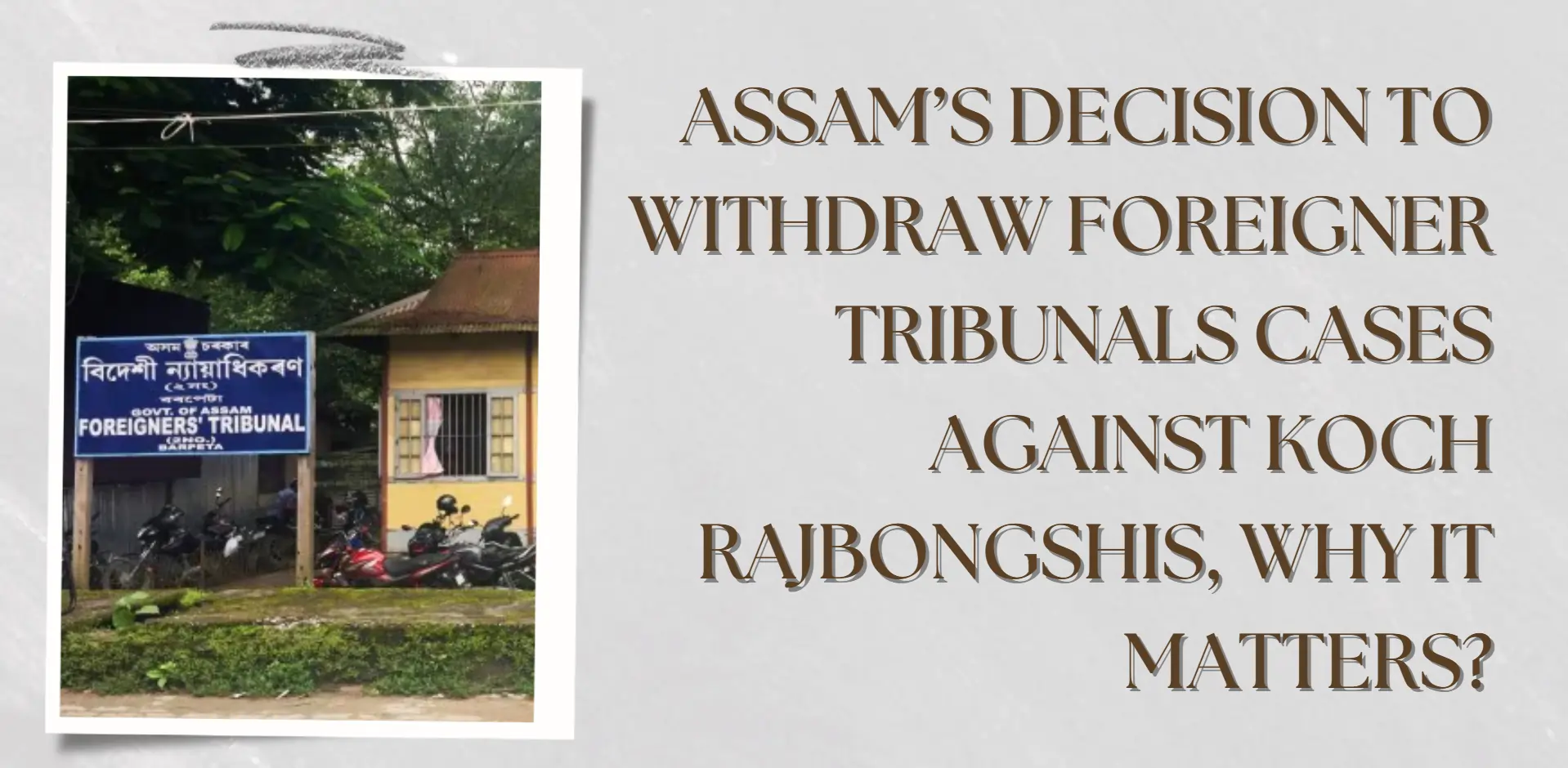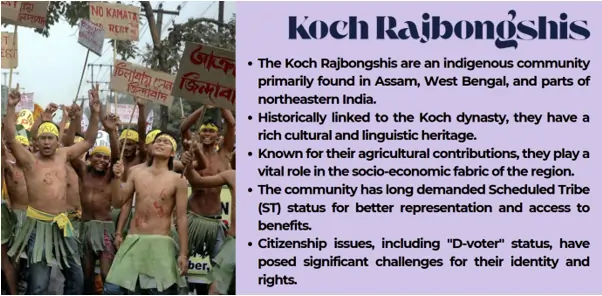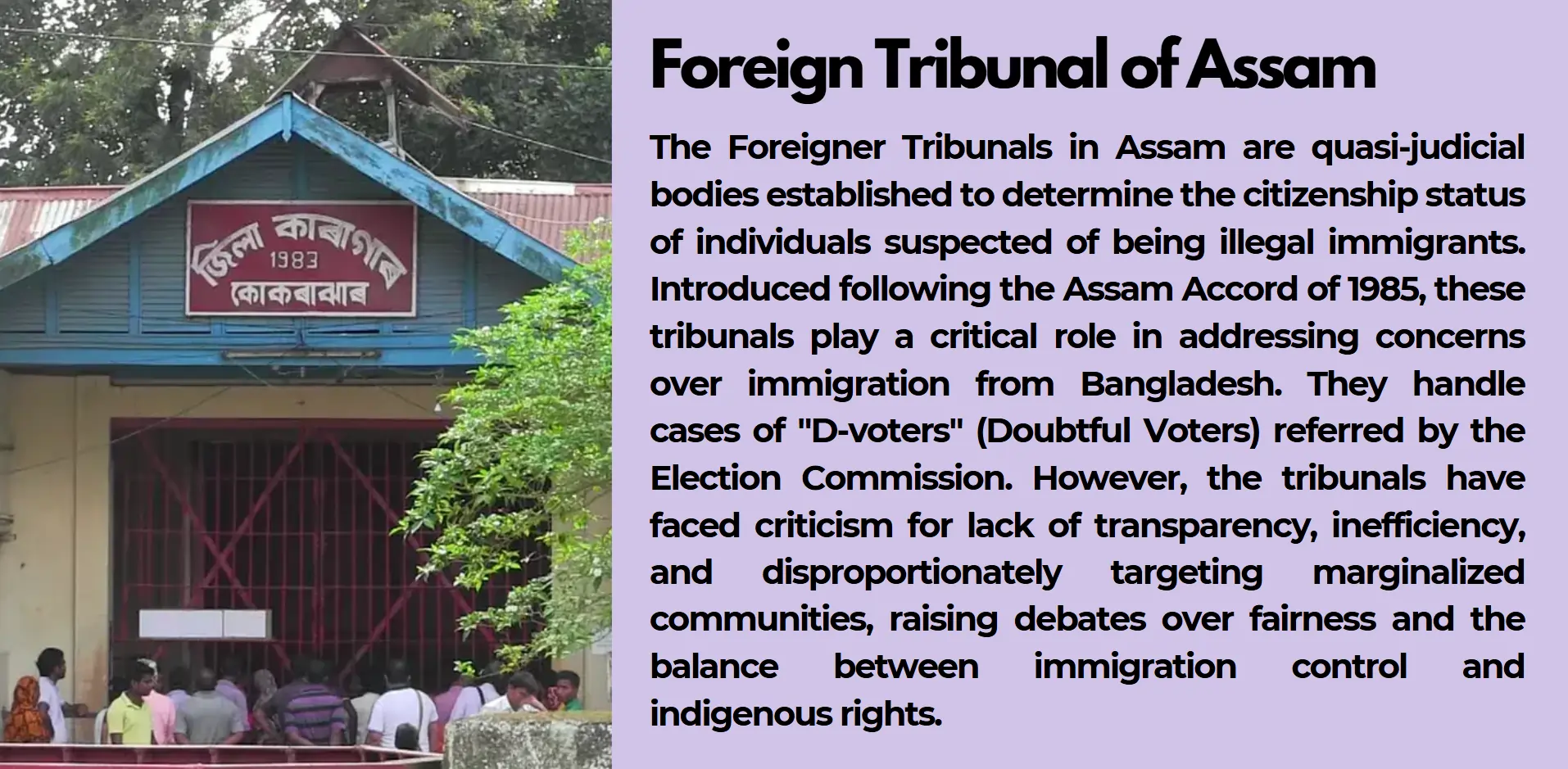The Assam government has withdrawn 28,000 Foreigner Tribunals cases affecting members from the Koch Rajbongshi community which resolved their D-voter status controversy. The administrative decision has influential consequences on electoral procedures together with indigenous rights and Scheduled Tribe entitlements besides Koch Rajbongshi identity validation.

The Assam Government showings its concerns have decided to repeal about 28000 Tribunal cases against Koch Rajbongshis. The distinctive heritage of Koch Rajbongshis who made important historical achievements struggles to prove citizenship because of on-going disputes related to 'D-voter' classification in Assam. The Foreigner Tribunals system established to decide state citizenship has faced criticism for targeting minority populations including the indigenous communities unequally. The action taken by Assam constitutes a development toward acknowledging both the Koch Rajbongshis as well as recognizing their legal status as citizens. The acceptance of citizenship affects electoral politics as well as indigenous rights and the Scheduled Tribe status status-seeking movement. In the Article impact of Assam granting status to Koch Rajbongshis is analyzed through examination of its political dimensions, the historical and sociological frameworks as well as the changes it brings to citizenship and identity within Assam.
Assam Withdraws Foreigners Tribunals Cases Against Koch Rajbongshis
The Koch Rajbongshi people have established themselves as cultural and historical flag-bearers of Assam throughout decades while contributing significantly to the development of the local social environment.
Who are the Koch Rajbongshis?
As a native community the Koch Rajbongshis inhabit Assam and West Bengal as well as the other northeastern Indian states. Throughout history the Koch rule existed during medieval times to oversee parts of this region. The community shows vibrant traditions alongside linguistic characteristics and traditional farming practices that enrich local culture across the region.

Challenges with Citizenship
The Koch Rajbongshis have fought citizenship-related problems since the beginning of the twentieth century. Members of the community faced being designated "D-voters" through the Foreigner Tribunals in Assam which challenged their legal Indian citizenship status. The official classification resulted in social segregation along with financial difficulties and disbarred access to government benefits. Complex ethnic divisions within Assam have intensified the situation because there remains a contentious dispute over how to identify indigenous identity.
Foreigner Tribunals in Assam
The state of Assam has launched Foreigner Tribunals as semi-judicial bodies to verify citizenship status among doubtful national subjects. After the Assam Accord of 1985 banned illegal immigration from Bangladesh these tribunals were established to handle cases of citizenship inquiries. The Koch Rajbongshis face excessive scrutiny from Foreigner Tribunals because these bodies direct their efforts against disadvantaged social groups. The accused persons handled the responsibility to demonstrate their innocence during drawn-out legal processes that created various types of uncertainty.

Socio-Political Context
A rights movement among Koch Rajbongshis exists because they want Scheduled Tribe (ST) status to secure better representation and benefits. Recent state actions such as withdrawing Foreigner Tribunals cases against the community indicate a transformation in governmental approach to the Koch Rajbongshis but still, political neglect persists. The government has taken this action to resolve past wrongs while enhancing indigenous cultural ties to Assam's political structure.
The Decision
Assam made a historic decision by withdrawing more than 28,000 Foreigner Tribunals cases involving Koch Rajbongshis to resolve their past grievances while defending their indigenous status.
Announcement by the Government
Chief Minister Himanta Biswa of Assam government under his leadership decided to remove all outstanding Koch Rajbongshi court cases thus marking an important period for this community. The government made this move because they acknowledged that Koch Rajbongshis form an essential part of Assam's ethnic and cultural heritage. Government officials declared the citizenship cases groundless and accused officials of wrongfully persecuting indigenous members which caused excessive anxiety about citizenship status.
Rationale behind the Move
Historical background together with cultural elements provided the main foundations for this government decision. Scholars view Koch Rajbongshis as Assam's longest-established native people since Foreigner Tribunals conducted investigations which generated issues about their membership status. The government intended to fix previous wrongdoings while building better community relationship through this move. The Koch Rajbongshis gained prominence as an influential voter group because the move follows political approaches to promote inclusivity before upcoming elections.
Impact on the Community
The Koch Rajbongshis benefit from this removal of cases since they have endured a lengthy period of being linked to "D-voter" stigma. With this decision the Koch Rajbongshis gain back their sense of belonging as citizens enabling them to seek better social and economic opportunities. Their ST recognition struggle receives stronger support through this move which has been a key community demand for many years.
Challenges in Implementation
The announcement holds considerable importance although effective practical execution proves difficult to achieve. The government faces challenges regarding the identification process which should lead to dismissing specific cases among the 28,000 registered cases. The accuracy of presented statistics along with doubts about their credibility challenges the expected meaningful outcomes resulting from this decision. Public opinion says achieving justice demands complete clarification alongside accurate visibility in every procedural step beyond political statements.
Political and Social Implications
The withdrawal of Foreigner Tribunals cases against Koch Rajbongshis by Assam administration will have significant political consequences and social impacts on indigenous rights and citizenship policy within the state.
Electoral Strategy and Political Timing
The decision to remove Foreigner Tribunal cases was made at this point before elections because the governing officials understood the Koch Rajbongshi electorate presented significant voting power as per its critiques. Through resolution efforts government seeks to enhance indigenous group connections as they set themselves up as right defenders for the communities. The political administration removed Foreigner Tribunal cases for electoral benefit mainly because Assam operates an ethnic identity-based voting system.
Recognition of Indigenous Identity
The withdrawal of cases gives vital social recognition to Koch Rajbongshis as established indigenous communities of Assam. Through this decision authorities seek to create rightfulness and boost Koch Rajbongshi cultural identity after suppressing both issues with citizenship and migration beliefs. Through these recognition members of the community experience greater sense of belonging accompanied with community pride thus improving regional and social cohesion because Assam features complicated ethnic communities.
Impact on Scheduled Tribe Status
This decision supports indirectly Koch Rajbongshi demands for Scheduled Tribe status which has been an on-going political and social movement. ST recognition benefits from the withdrawn cases because they validate the indigenous identity of the community. The decision provides an opening for better tribal representation and benefit opportunities which helps resolve socioeconomic inequalities.
Criticism and Concerns
The implementation met resistance because observers believe the motivation stemmed from politics instead of genuine efforts to handle systemic issues. The Argument against this move claims it will produce insignificant improvements to the economic standards of the tribal community. Concerning aspect exists about process clarity as well as reliability since people question both the accuracy of the reported 28,000 figure and the practicality of deploying these policies.
Broader Context
The decision to withdraw Koch Rajbongshi Foreigner Tribunals cases belongs to a wider pattern of events within Assam's on-going identity and social political dynamics.
Similar Decisions for Other Communities
In previous times Assam carried out similar action by dropping cases against Gorkhas. This represents an emerging acceptance by the government to recognize indigenous groups alongside their problems regarding citizenship matters. The state government works towards building community unity by resolving multiple ethnic grievances to eliminate conflicts caused by identity disputes.
Scheduled Tribe Status Debate
For many decades the Koch Rajbongshis have pursued their demand to be recognized as Scheduled Tribe under constitutional provisions. The cases' withdrawal demonstrates advancement in understanding the indigenous nature of the community yet this action stops short of resolving the question about ST status. Through this decision they increase their chances to obtain future recognition because it validates their historical and cultural importance.
Assam’s Narrative of Identity and Citizenship
Historical migration together with diverse ethnic backgrounds has made Assam's social and political system deeply connected to both citizenship and identity issues. The Foreigner Tribunals created to regulate immigration caused disputes about indigenous population rights through their judicial actions. The state of Assam now focuses on reconciling with Koch Rajbongshis instead of using exclusionary approaches by withdrawing previous cases against them.
Implications for National Policy
Beyond Assam this decision proceeds to expose how Indian authorities manage to handle citizenship assessment in combination with indigenous rights protection. The current situation questions the functions and legitimacy of Foreigner Tribunals among quasi-judicial bodies alongside the need to establish transparent policy frameworks. Other states may find a precedent in this decision to address their problems of marginalized community protection.
The decision of Assam gains prominent value since it impacts Koch Rajbongshis and shapes the state's on-going journey regarding identity and citizenship governance.
Challenges and Controversies
The decision by Assam to abandon Koch Rajbongshi Foreigner Tribunals cases stands as a major development although its implementation has sparked various controversies and problems.
Difficulty in Identifying Eligible Cases
The identification of appropriate cases for withdrawal advancement constitutes a pivotal obstacle in this process. Public distrust surrounds the determination process for the 28,000 case number demonstrated by the government concerning the Koch Rajbongshi community. Due to insufficient verification procedures for dismissing these cases the process raises doubts about incorrect or mistaken identifications.
Accuracy of Data and Figures
Several analysts doubt the government’s veracity in providing figures about which cases would be withdrawn. Critics doubt the accuracy of the presented figures since they suspect these numbers could result from political motivations which question the transparency of the withdrawal process. The absence of documented records along with comprehensive data continues to fuel controversy because of a lack of transparency.
Concerns about Practical Implementation
While the initial decision may show good intentions there exist many practical challenges as part of its execution. Multiple agencies need to collaborate on extensive legal and bureaucratic procedures that determine the withdrawal procedure. The process of both keeping eligible cases included and eliminating fraudulent ones requires extensive efforts and time commitment between these two goals. The community expresses worry about how the decision will fulfil its intended goals.
Allegations of Political Motives
People have accused the government of using this decision for voter support due to its timing during election year. The critics maintain that the government declared the decision primarily to gain Koch Rajbongshi community backing rather than solving fundamental problems. The credibility of this initiative faces potential damage from these baseless accusations that take away vital attention from essential justice and inclusion matters.
Broader Implications for Citizenship Policies
The decision forces officials to rethink both Foreigner Tribunals and the means to identify Assamese citizenship. The recent controversies in this matter underline the necessity to establish fair and transparent citizenship verification procedures which protect the rights of indigenous people.
Conclusion
The Koch Rajbongshi community of Assam received relief from Foreigner Tribunals through Assam's recent decision to drop all pending cases against them. Despite enabling social relief the Government’s decision created new issues due to execution difficulties as well as conflicting perspectives about its original goal in Assam's citizenship and identity debates. The completed decision demonstrates how to establish important principles for building an inclusive and just political framework throughout the regional social structure.